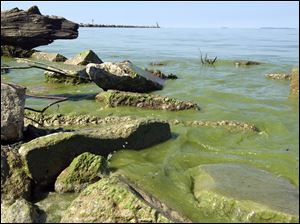
EPA RULING
U.S. won't force Ohio to label Lake Erie 'impaired'
President Trump seeks again to drop Great Lakes restoration funds
5/23/2017Documents released late Monday show the federal government won’t compel the state to declare Ohio’s portion of western Lake Erie as impaired, a move that environmentalists and Lucas County commissioners believe will hurt the lake’s future water quality.

The federal government won’t compel the state of Ohio to declare Ohio’s portion of western Lake Erie as impaired, a move that environmentalists and Lucas County commissioners believe will hurt the lake’s future water quality.
And, in a separate-but-related matter, the Trump Administration released its 2018 budget plan that — once again — calls for the elimination of the Great Lakes Restoration Initiative, which since 2009 has provided roughly $300 million a year in new money for water quality improvement efforts from Duluth to Montreal. Western Lake Erie — the warmest, shallowest, and most biologically active area for region’s $7 billion fishery — stands to be hit hard by that decision.
The U.S. Environmental Protection Agency quietly issued a long-awaited decision regarding Lake Erie’s proposed impairment designation for Ohio on Friday, just days after environmentalists filed a second federal lawsuit demanding a decision. By law, the agency was supposed to issue a ruling back in November.
The document and cover letter were made public Monday, drawing a swift response from a cross-section of environmental groups as well as Lucas County commissioners.
The letter was addressed to Ohio EPA Director Craig Butler and signed by a former Ohio EPA director, Chris Korleski, who in recent years has been head of the U.S. EPA’s Great Lakes National Program Office in Chicago. In January, Mr. Korleski was moved into the position of U.S. EPA Region 5 water director.
“In reaching its decision, [the U.S.] EPA has deferred to the State’s judgment not to assess the open waters of the Western Basin of Lake Erie for the 2016 list,” Mr. Korleski wrote, referring to the state of Ohio’s list of impaired waters from last fall which fails to include western Lake Erie. He said the federal agency recognizes Ohio’s “ongoing efforts to control nutrient pollution.” Those efforts, according to critics, rely too heavily on voluntary incentives that are embraced in concept by the agricultural industry but not in practice by enough farmers.
The state of Michigan went the opposite direction in 2016, declaring its much smaller portion of western Lake Erie as impaired.
An impairment designation legally would set up the region for a more specific investigation into the sources of algae-growing phosphorus and nitrogen releases.
According to a statement from the Lucas County Board of Commissioners, the U.S. EPA “can’t have it both ways” by first agreeing with Michigan that the open waters of western Lake Erie are impaired by nutrients, then yielding to the state of Ohio’s opposition.
The trio of Democrats who comprise that county board described the situation as “foot-dragging by the Trump and Kasich administrations” that puts Toledo and Lucas County “in harm’s way.”
The Kasich administration steadfastly has said it can gain as many or more results with less regulation by sticking to voluntary incentives.
The U.S. EPA decision “preserves a status quo of insufficient action and lack of urgency in addressing one of the most vexing problems facing Lake Erie and the many people, communities, and businesses which rely on it for their drinking water, jobs, and way of life,” Frank Szollosi, a former Toledo city councilman now with the National Wildlife Federation, said in a joint statement issued by his group, the Environment Law & Policy Center, Michigan United Conservation Clubs, the Ohio Environmental Council, Alliance for the Great Lakes, and the Lake Erie Foundation.
Environmentalists reacted with equal outrage to the Trump Administration’s 2018 budget plan, which was released at 9 p.m. Monday, which again seeks to end the Great Lakes Restoration Initiative that has generated more than $2 billion for previously unfunded restoration work over the past eight years.
Howard Learner, executive director of the Chicago-based Environmental Law & Policy Center, called the proposal for fiscal year 2018 “foolish and misguided.”
U.S. EPA Administrator Scott Pruitt supports the proposal, saying it’s time to go “back to basics.”
“What could be more basic than restoring the Great Lakes and protecting safe, clean drinking water?” Mr. Learner asked, referring to how the lakes are the raw source of drinking water for 30 million Americans and 10 million Canadians.
The Trump Administration tried to gut GLRI funding for the remainder of the 2017 fiscal year budget but was turned down by Congress, which voted to keep programs at their current funding level of $300 million.
The Chesapeake Bay, Puget Sound, and about 10 other geographic areas will join the Great Lakes in programs that could be gutted in the 2018 fiscal year if Congress passes the Trump plan, which also calls for more than a 30 percent cut in U.S. EPA funding, said S. William Becker, executive director of the National Association of Clean Air Agencies.
Contact Tom Henry at: thenry@theblade.com, 419-724-6079, or via Twitter @ecowriterohio.